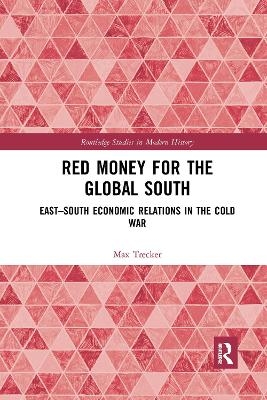
Red Money for the Global South
East–South Economic Relations in the Cold War
Seiten
2021
Routledge (Verlag)
978-1-032-17361-0 (ISBN)
Routledge (Verlag)
978-1-032-17361-0 (ISBN)
Red Money for the Global South explores the relationship of the East with the "new" South after decolonization, with a particular focus on the economic motives of the Council for Mutual Economic Assistance (CMEA) and other parties that were all striving for mutual cooperation.
Red Money for the Global South explores the relationship of the East with the “new” South after decolonization, with a particular focus on the economic motives of the Council for Mutual Economic Assistance (CMEA) and other parties that were all striving for mutual cooperation.
During the Cold War, the CMEA served as a forum for discussions on common policy initiatives inside the so-called “Eastern Bloc” and for international interactions. This text analyzes the economic relationship of the East with the “new” South through three main research questions. Firstly, what was the motivation for cooperation? Secondly, what insights can be derived from CMEA negotiations about intrabloc and East—South relations alike? And finally, which mutual dependencies between East and South developed over time?
The combination of analytical narrative and engagement with primary archival material from former CMEA states, and India as the most prestigious among the former European colonies, makes this text essential reading for students and instructors of Cold War history, Economic History, and international relations more generally.
Red Money for the Global South explores the relationship of the East with the “new” South after decolonization, with a particular focus on the economic motives of the Council for Mutual Economic Assistance (CMEA) and other parties that were all striving for mutual cooperation.
During the Cold War, the CMEA served as a forum for discussions on common policy initiatives inside the so-called “Eastern Bloc” and for international interactions. This text analyzes the economic relationship of the East with the “new” South through three main research questions. Firstly, what was the motivation for cooperation? Secondly, what insights can be derived from CMEA negotiations about intrabloc and East—South relations alike? And finally, which mutual dependencies between East and South developed over time?
The combination of analytical narrative and engagement with primary archival material from former CMEA states, and India as the most prestigious among the former European colonies, makes this text essential reading for students and instructors of Cold War history, Economic History, and international relations more generally.
Max Trecker is at the Leibniz Institute for Contemporary History, Munich, Germany. He is currently working on privatization in Eastern Europe in the 1990s.
Introduction; Part One: Inner Integration and First Contacts with the South; 1. The Dawn of the CMEA; 2 Decolonization and the reaction of the East; Part Two: The Complex-Program; 3 The Reforms of 1971; 4 The Allure of the West: Disintegration in the East? 5 Power and Dissent; Part Three: Red Globalization; 6 Expansion of the CMEA; 7 The View of the South; Part Four: Financial Schockwaves; 8 The Crisis of the 1980s; 9 Who belongs to the "Third World", who to the "Second"? Mutual Dependencies; 10 Gorbachev, India, and the CMEA; Conclusion
| Erscheinungsdatum | 01.10.2021 |
|---|---|
| Reihe/Serie | Routledge Studies in Modern History |
| Verlagsort | London |
| Sprache | englisch |
| Maße | 156 x 234 mm |
| Gewicht | 362 g |
| Themenwelt | Geschichte ► Allgemeine Geschichte ► Zeitgeschichte |
| Naturwissenschaften ► Geowissenschaften ► Geografie / Kartografie | |
| Sozialwissenschaften ► Soziologie ► Spezielle Soziologien | |
| Wirtschaft ► Volkswirtschaftslehre | |
| ISBN-10 | 1-032-17361-0 / 1032173610 |
| ISBN-13 | 978-1-032-17361-0 / 9781032173610 |
| Zustand | Neuware |
| Haben Sie eine Frage zum Produkt? |
Mehr entdecken
aus dem Bereich
aus dem Bereich
Gewalt, Umwelt, Identität, Methode
Buch | Softcover (2024)
Spector Books OHG (Verlag)
36,00 €
wie Freud im Kollektiv verschwand
Buch | Hardcover (2024)
Klett-Cotta (Verlag)
25,00 €


